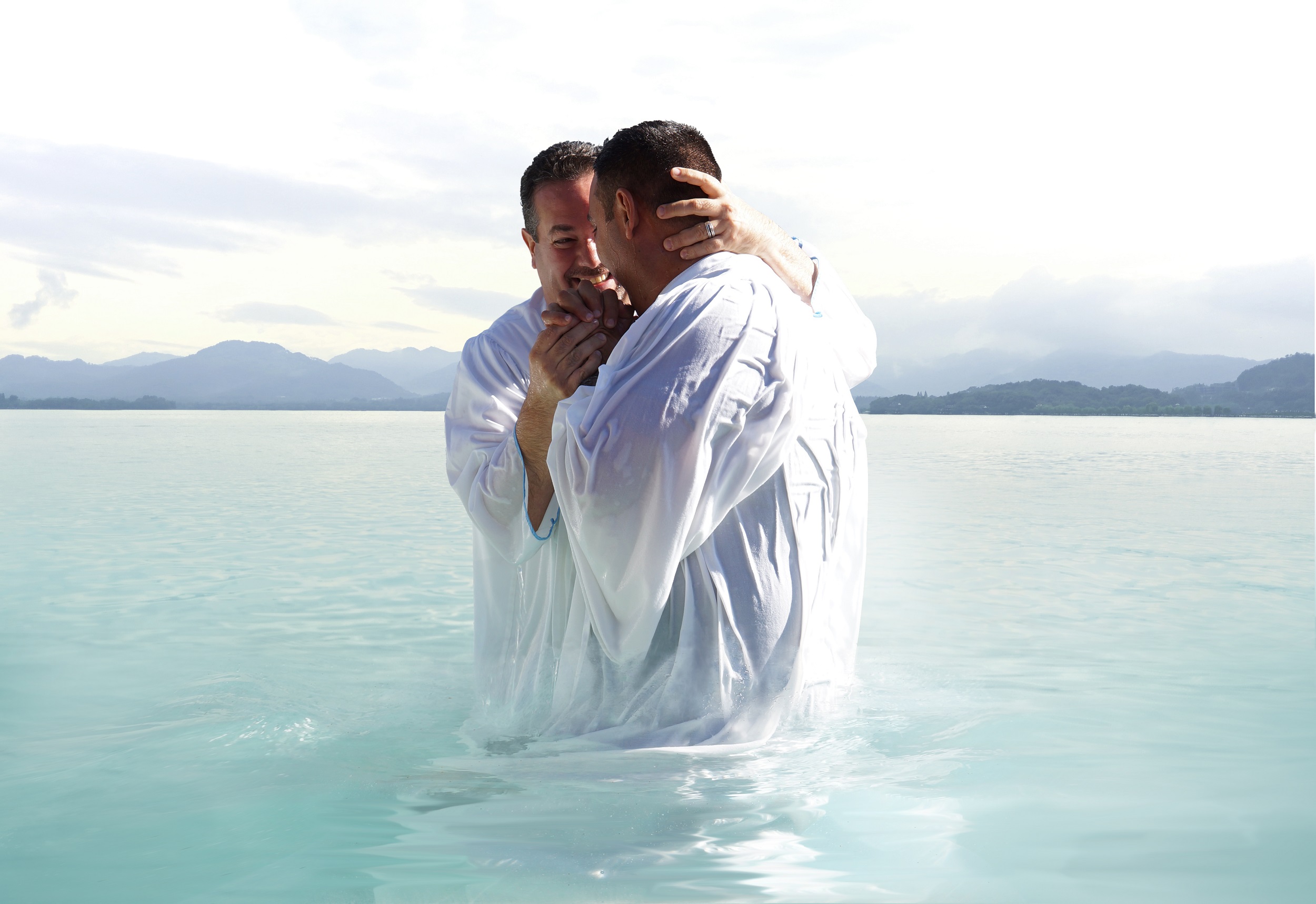Last edited on 27/Mar/2021
The Bible’s Answer
Introduction
Baptism is a sacrament in Christianity. This means that it is a visible and tangible means of God’s grace, instituted by Jesus Christ. The Word of God, i.e. the Bible, is not a sacrament because receiving Jesus Christ through faith by what was written about him in the gospel is an invisible means of God’s grace. In other words, we cannot see or experience anything happening physically; we simply receive the gospel’s promises through faith and believe that for Christ’s sake we have eternal life. In baptism, however, God himself brings us all the promises of the gospel in a way that we can see, feel, and physically comprehend, to all those who believe.
What Baptism Looks Like
During baptismal ceremonies, a pastor (or a layperson in emergencies) pours, sprinkles, or immerses a Christian in water while speaking to them Christ’s command, referring to Matthew 28:19 in the Bible, which usually sounds something like: “I baptise you in the name of the Father, and of the Son, and of the Holy Spirit. Amen” (or in the name of “Jesus”, as in Acts 10:48, which is just shorthand for the Triune God). The mode by which the water is applied, such as pouring or sprinkling on the forehead, or by full immersion, depends on which church it is done in. This can be done over (or in) a baptismal font within church, or in a pool or lake outside of church.
The person who is baptising will ask the recipient about their faith, to see if they are truly willing to undergo the rite, and the Christian will answer by declaring their absolute allegiance to Christ. This is usually done in the presence of Christian witnesses, but sometimes it can include non-Christian witnesses. Then, the Christian is baptised, and this serves as a public testimony for the congregation that the recipient’s faith is genuine and that he or she is now a member of the universal body of Christ, the church. Ideally, baptism should be the first thing that happens right after a person converts to Christianity (Acts 8:12; 10:44–48).
On many occasions, the infants of Christian parents are baptised, and this is also a biblical practice (Acts 2:38–39; Colossians 2:11–12). In this case, the parents of the infant swear allegiance to Christ on behalf of their child, and promise to raise him or her in the Christian faith and church. Because they will be raised in the faith by their parents and will therefore be known to the church community, there is no need for the child to be baptised at a later stage to show their public testimony, since it is already evident to the community that they are Christians. Instead, this testimony comes at a later stage in the Christian rite of Confirmation.
What Happens in Baptism?
The Bible says that in baptism we are buried with Christ and raised with him through faith in the powerful working of God, who raised Christ from the dead (Colossians 2:12). In baptism we die with Christ so that we will one day rise again like him; it unites us with his death and resurrection (Romans 6:3–5). Paul explains shortly after that being united with Christ’s death and resurrection not only means that we share eternal life with Jesus, but also that at the present time we must consider ourselves dead to sin and alive to God in Christ Jesus (Romans 6:9–11).
In baptism we put on Christ (Galatians 3:27), are forgiven of all our sins, receive the Holy Spirit (Acts 2:38), and are born again of water and the Spirit (John 3:5). In baptism we are regenerated by the washing of the Spirit (Titus 3:5) and incorporated into the church, the body of Christ (1 Corinthians 12:13). Baptism washes away our sins (Acts 22:16), cleanses us (Ephesians 5:25–27; 1 Corinthians 6:11), and sprinkles our hearts clean of an evil conscience (Hebrews 10:22). Baptism saves us by the resurrection of Jesus Christ (1 Peter 3:21). Through baptism, we are made disciples, and Jesus promises to be with us forever (Matthew 28:19–20).
Since we have seen from the above passages that the Holy Spirit, the third Person of the Holy Trinity who gives faith to God’s people, works through baptism and is given to people in it, it is evident from this that in baptism God creates and strengthens the gift of faith in us. Furthermore, faith and baptism are intimately linked and inseparable; baptism is of no use to anybody unless faith is present to believe in the promises connected to it.
It is clear from these Bible passages that baptism is more than just a mere symbol, contrary to what some churches teach, and that it is in fact a free, precious gift of God, that is to be received by simple trust in the promises attached to it. Jesus himself said “Whoever believes and is baptised will be saved” (Mark 16:16). To associate baptism with salvation in such strong ways is not figurative language; baptism does indeed save us.
Do you not know that all of us who have been baptized into Christ Jesus were baptized into his death? 4 We were buried therefore with him by baptism into death, in order that, just as Christ was raised from the dead by the glory of the Father, we too might walk in newness of life. 5 For if we have been united with him in a death like his, we shall certainly be united with him in a resurrection like his. (Romans 6:3–5)
For in one Spirit we were all baptized into one body—Jews or Greeks, slaves or free—and all were made to drink of one Spirit. (1 Corinthians 12:13)
Baptism, which corresponds to this, now saves you, not as a removal of dirt from the body but as an appeal to God for a good conscience, through the resurrection of Jesus Christ, . . . (1 Peter 3:21)
Baptism: Our Work or God’s Work?
Some Christians mistakenly believe that because the Bible teaches that salvation is by grace alone through faith alone in Christ alone (Romans 3:21–26, Romans 4:2–5, Romans 10:9–15, Galatians 2:16, Galatians 3:1–9, Ephesians 2:8–9), that baptism is therefore purely symbolic and does nothing. They also mistakenly believe that to say that baptism gives us salvation, forgiveness, grace, etc. is a works-based righteousness doctrine, because they believe that baptism is a good work that we do for God. Such Christians would therefore interpret all of the above Bible passages as symbolic rather than literal, even though there is no warrant for doing so.
While baptism may indeed seem like something we do at first glance, in reality it is something that God does for us. Titus 3:4–6 tells us that the washing of regeneration and renewal, which refers to baptism, is done by the Holy Spirit, not us. In other words, in baptism we are purely passive recipients who freely receive the cleansing benefits of the Holy Spirit. Furthermore, John 3:5 teaches that we are born again by water and the Spirit, another passage which refers to baptism. There is nothing that we do to make ourselves born again; this is the work of the Holy Spirit, who works through the waters of our baptism to accomplish this, while we passively receive these benefits.
Matthew 3:11 says that Jesus is the one who baptises us with the Holy Spirit; thus Christ is the true baptiser, not us. When Jesus was baptised, Heaven was opened, the Holy Spirit descended on him, and God the Father spoke with him (Mark 1:10–11), which tells us that baptism is not simply a special ceremony, but that it is a ceremony which has divine power at work. Although pastors baptise Christians, they are only acting on behalf of God, in the same way that prophets acted on God’s behalf, and everything they said was considered the Word of God when speaking in the name of the Lord (2 Peter 1:21).
From all this it is clear that baptism is not a good work that we do for our salvation, but rather it is a good work that God does for us. In fact, God saves us by his grace alone, but he has chosen to deliver this grace to us by certain means: the Word of God (The gospel), baptism (our death, burial, and resurrection with Christ), and Holy Communion (the body and blood of Christ). In each of these means, God is at work, not us. All we do is receive the benefits of eternal life that is promised to us in each of these means by faith. Furthermore, because God gives us his grace and forgiveness in these means, this in turn strengthens and nurtures our saving faith. From this, we see that because baptism is one of the means of grace, and not the only one, it is possible for a Christian to be saved before, during, or after their baptism. Hence, a newly converted Christian adult would be saved before getting baptised, in the same way that a baby who has just gotten baptised would be saved before being able to fully articulate his or her Christian faith.
Some Christians may question the idea of receiving more grace and forgiveness in the means of grace after their moment of conversion, at which point they were saved. To answer this, we would do well to remember what Jesus said in the Lord’s Prayer. He taught us that whenever we pray to God, we should ask him to forgive us our trespasses (Matthew 6:12) and that if we forgive others their trespasses, we will also be forgiven (Matthew 6:14). What this shows us is that even Christians who believe and therefore have assurance of their salvation (Ephesians 1:13–14; Hebrews 10:19–22) can still receive more of God’s grace. God’s grace does not stop being given the moment one believes in Jesus; therefore, there is no reason to believe that baptism is symbolic and does absolutely nothing. This is actually contrary to the Bible’s teachings.
Final Important Biblical Teachings on Baptism
Baptism Must Include Water and the Word of God
Firstly, it is important to note that water itself has no divine properties; however, the Word of God does. When ordinary water is joined with the Word of God, i.e., the command of Christ to baptise all nations into the Triune God’s name and the promise that he will be with us forever, it becomes life-giving water; that is to say, it becomes baptism (Ephesians 5:25–27). God is able to use seemingly ordinary things to accomplish his great purposes. With that being said, baptism must include water for it to be a real baptism, as the Bible makes clear (Acts 8:36–38; Acts 10:47–48).
Baptism Must Be Accompanied By Faith to Be of Benefit
Secondly, it is also worth noting that faith is necessary for baptism to have any benefit on the recipient (Hence why Peter said to “Repent and be baptised,” Acts 2:38). Baptism does not make anyone a Christian if faith is absent. Many people were baptised as infants but are no longer Christians as teenagers or adults. Although God brought them into his kingdom and family when they received the Sacrament, because they have now rejected him, this means that they have also rejected the promises given to them in baptism, which was bought by the blood of Jesus. However, they are free at any time to return to God through faith in Jesus Christ, and then it will once again be of benefit to them.
Infant Baptism Is Biblical
Thirdly, infants can be baptised just like adults. Some Christian denominations and non-Christian cults teach that one must reach a certain age of accountability, when they can fully articulate their faith in Christ and choose by their own free will to be baptised, before they can get baptised. However, this practice is not biblical. In no place does the Bible put age restrictions on who can be baptised, or on who is acceptable to God. To the contrary, Jesus accepted infants who were brought to him by their mothers, who were too young to even articulate their faith, and he said that the kingdom of God belongs to them (Luke 18:15–17).
Furthermore, the Bible calls baptism “a circumcision made without hands”, and “the circumcision of Christ” (Colossians 2:11–12), which is conclusive proof that infants can be baptised, because under the Old Covenant circumcision was performed on male infants (Genesis 17:9–14). But now under the New Covenant, baptism, which is the circumcision of Christ, is performed on both males and females. Just as it was the custom of the Jews in the Old Testament to circumcise their households and teach them the faith, it became the custom of Christians in the New Testament to baptise entire households and teach them the faith (Acts 16:14–15; Acts 16:28–33), and households include infants and children.
Everyone is born with sin, including children (Romans 5:12–21), which is evident due to the fact that we can all die (Romans 6:23), therefore, children are in need of the forgiveness of their sins too. The Bible teaches that baptism is a gift which gives us the forgiveness of sins and the Holy Spirit, and that it is for adults and their children (Acts 2:38–39). Jesus taught that all nations are to be baptised, and infants are included in all nations (Matthew 28:19–20), and that the kingdom of Heaven belongs to infants (Luke 18:15–17). Therefore, baptism is a wonderful way for infants of Christian parents to freely receive the forgiveness of sins and therefore have the assurance of salvation.
Because the Holy Spirit is given in baptism (Acts 2:38), this also means that when he enters infants the moment they are baptised he creates faith in their hearts to believe in the baptismal promises, just as when John the Baptist was still in his mother’s womb, and the Holy Spirit created faith in his heart (Luke 1:14–15, 41–44). A baby can indeed have faith in Christ without being able to fully articulate it, in the same way that a baby naturally has faith in his or her mother.
There Is Only One Baptism; Re-baptisms Are Not Permissible
Fourthly, the Bible teaches that a Christian must be baptised only once, and never again, because there is only one baptism (Ephesians 4:4–6). A Christian should not get re-baptised just because they join another church, or because they were baptised as a baby but fell away from the Christian faith, nor should they get re-baptised if they have fallen away from the faith as adults and then come back, because their first baptism is still valid forever. We may fail in our commitments to God at times, but God never fails when he makes his commitment to us in our baptism. The only exception to this rule is if someone was baptised in a non-Christian cult, which was not a real baptism in the first place.
Some teach that there are two baptisms: water baptism and baptism of the Holy Spirit, and that baptism of the Holy Spirit happens before water baptism. However, this is incorrect, because as already mentioned, the Bible says that there is only one baptism. Baptism includes water (Acts 8:36–38; Acts 10:47–48), the Word of God (Matthew 28:19–20; Ephesians 5:25–27), and the working of the Holy Spirit (John 3:5; Acts 2:38; Titus 3:5).
There Are Three Modes of Baptism
Fifthly, Christians may be baptised by having water sprinkled (reflecting Hebrews 10:22) or poured (reflecting Acts 2:17) on their foreheads, or they may be submerged in water and taken back up (reflecting Colossians 2:12). The Bible does not specify any one of these methods as being the only correct one, and each of them reflect biblical images of what Jesus does for us in baptism.
Every Christian Must Get Baptised
Finally, the Bible makes it clear that every Christian must be baptised. There is no exception to this rule. When people heard the gospel from the Apostles and believed, their first response was to receive baptism (Acts 2:41; Acts 8:12–13; Acts 9:17–18; Acts 10:47–48; Acts 16:14–15; Acts 16:32–33, etc.). This should be the same response for everyone who becomes a Christian. Jesus said:
Go therefore and make disciples of all nations, baptizing them in the name of the Father and of the Son and of the Holy Spirit, 20 teaching them to observe all that I have commanded you. And behold, I am with you always, to the end of the age. (Matthew 28:19–20)
Jesus said that receiving baptism means that we become disciples or followers of Christ. Hence, if we reject this free gift of God, then we are not Christ’s disciples or followers. However, it is very important to note that there are certain exceptions to this rule: In the instance when a Christian wants to get baptised but dies beforehand, or if someone is prevented from getting baptised and then dies, then this does not mean that the Christian will not go to Heaven. Jesus said that it is the lack of faith in him that damns the soul, not the lack of baptism (Mark 16:16). Baptism is one of the means of God’s grace, not the only one. However, if someone claims to be a Christian, but refuses to receive God’s free gift of baptism, then this is a sign that they are not a true believer, because something is seriously wrong with their faith.
Conclusion
Let us now recap briefly; what is baptism? Baptism is a sacrament, that is, a visible and tangible means of God’s grace, instituted by Jesus. It is a work of God, whereby we receive the forgiveness of all our sins, salvation, the Holy Spirit, a spiritual rebirth, membership in the universal church, and unity with Christ. It is a free gift for everyone, whether they are infants or adults.
The three means of God’s grace are his Word (the Bible) and Sacraments (baptism and Holy Communion). The Word of God and the Sacraments all point to Jesus’ suffering, death, burial, and resurrection for the forgiveness of our sins. We simply receive the promises contained therein, bought by the precious blood of Christ, through faith alone. In baptism, a pastor sprinkles or pours water on the forehead of a Christian, or submerges them in water, in the name of the Father, Son, and Holy Spirit (or Jesus). It is not the application of water alone that accomplishes such great things, but water with the Word of God and its promises attached to it, along with the powerful working of the Holy Spirit.
It is not the lack of baptism that damns a soul, but rather the lack of faith; one who claims to be a Christian while at the same time rejecting God’s gift of baptism displays signs of disbelief and non-genuine faith. While Christians have assurance of salvation the moment they believe, this does not mean that they can no longer receive God’s grace in baptism, Holy Communion, and by praying to him for forgiveness, as our Lord Jesus Christ explains. Baptism is not merely a symbol that does nothing; God uses baptism for his great and mighty purposes, for the benefit of all his creation.
And now why do you wait? Rise and be baptized and wash away your sins, calling on his [Jesus’] name. (Acts 22:16)
All scripture quotations are from The Holy Bible, English Standard Version Copyright © 2001 by Crossway Bibles, a division of Good News Publishers unless specified otherwise.







